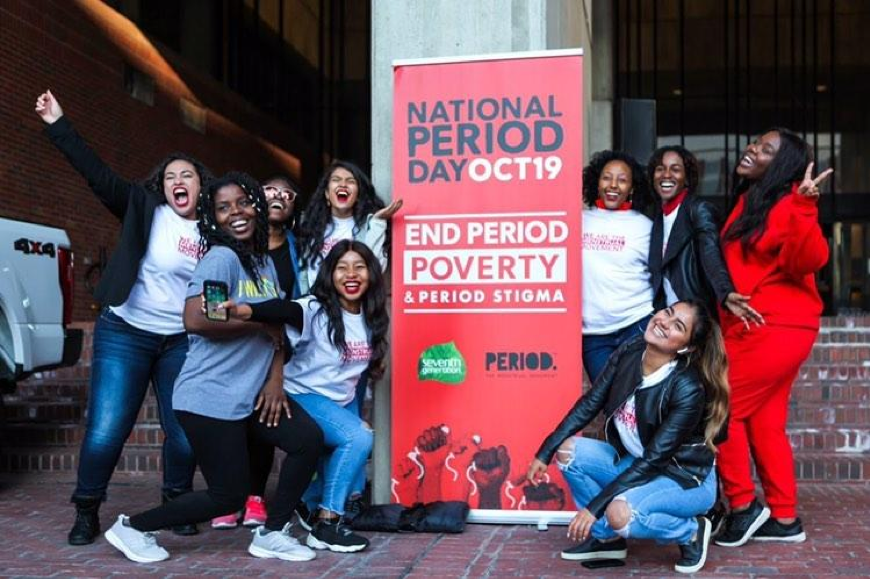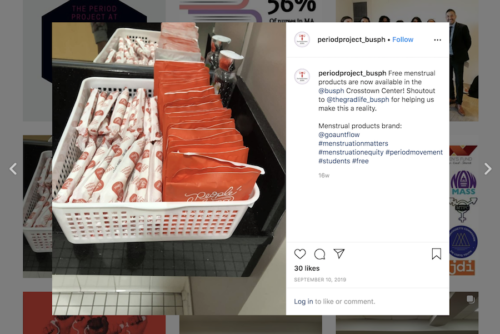PHX Perspectives | January 7th, 2020
All public health practitioners have a unique story as to how they entered this field. The uniqueness of these stories is most likely due to the fact that there is no one set path which leads to a career in public health. Just think about it. When asked the question, What do you want to be when you grow up?, almost no child responds: I want to be an epidemiologist, mommy! If you did have that response growing up, your name today is probably Sandro Galea.
The members of the Period Project at BUSPH are no exception to this narrative. We are former students in biology, political science, women and gender studies, and global studies. We came to this program after working as paralegals in Washington, D.C., sex educators in New York City, family planning consultants in Nigeria, and so much more. Despite our broad range of experiences, what unifies us is our common belief in the public health mission that every menstruating individual should have access to clean and consistent period products. This shared belief is what brought us together during our time as MPH students at Boston University School of Public Health, and what continues to fuel our advocacy work over a year later today.
In fact, our approach to most of our work as a student-led organization derives from elements learned through the core curriculum at BUSPH. For instance, the Leadership and Management class taught us the importance of having a personal mission, of valuing the role of teams, and of setting agendas before meetings. Our Leadership and Management class is also partly the reason why we formed our group. When Associate Dean for Public Health Practice Harold Cox was a guest lecturer in our class, he urged us to activate around health campaigns which ignite us. Additionally, the Individual, Community, and Population Health (ICPH) course made us think about different frameworks in addressing public health issues, such as lack of access to menstrual products. ICPH also had us consider different ways to communicate the importance of menstrual equity to other community stakeholders, who might not be so engaged in this issue area. Furthermore, the Quantitative Methods course instilled in us the significant role that data plays in telling the story of public health issues within a given community. For this reason, we circulated a survey early last semester to collect data on the state of menstrual equity on campus. Our survey results indicated that 14.2% of student respondents either missed a significant portion of class or an entire class altogether because of limited access to period products on campus. These results then supported the launching of our pilot program, which would provide free disposable and organic period products in eight centrally-located restrooms in the Talbot Building on campus. After monitoring and evaluating product usage in each bathroom for 5 weeks, we saw the need for an institutional policy change, a concept derived from taking Health Systems, Law, and Policy.
Now, not only do we have institutional support for free menstrual products in two main buildings on campus, but we also have been able to advocate for menstrual equity beyond the school community.
 On a national level, the Period Project at BUSPH had the opportunity to co-sponsor the National Period Day Rally in Massachusetts, a demonstration that occurred on October 19, 2019 in front of Boston City Hall. The demonstration was part of a larger movement to get free period products in all schools, homeless shelters, and prisons as well as remove the “tampon tax” from 35 other states in America. We have also been able to bring visibility to the need for menstrual equity at the state-level by garnishing support for the I AM. bill (H. 1959/S.1274), a legislative bill which would increase access to disposable menstrual products across all Massachusetts public schools, homeless shelters, prisons and jails. The Period Project even had one of our own members work on cost research in support of the bill as part of her summer practicum in the office of one of the bill’s lead co-sponsors. On a more local level, we organized “monthly flow drives” all summer-long through the Activist Lab to collect period products to distribute to the residents of Rosie’s Place, a shelter for homeless women located a few blocks from campus.
On a national level, the Period Project at BUSPH had the opportunity to co-sponsor the National Period Day Rally in Massachusetts, a demonstration that occurred on October 19, 2019 in front of Boston City Hall. The demonstration was part of a larger movement to get free period products in all schools, homeless shelters, and prisons as well as remove the “tampon tax” from 35 other states in America. We have also been able to bring visibility to the need for menstrual equity at the state-level by garnishing support for the I AM. bill (H. 1959/S.1274), a legislative bill which would increase access to disposable menstrual products across all Massachusetts public schools, homeless shelters, prisons and jails. The Period Project even had one of our own members work on cost research in support of the bill as part of her summer practicum in the office of one of the bill’s lead co-sponsors. On a more local level, we organized “monthly flow drives” all summer-long through the Activist Lab to collect period products to distribute to the residents of Rosie’s Place, a shelter for homeless women located a few blocks from campus.
Each of these opportunities would not have been possible without the education received at BUSPH. Since its inception, the group has relied on the core principles of our public health education to help guide our work in a way that puts community members first. Even now that we are an official student group, we still depend on our education to try to build our membership base and ensure the sustainability of our group after we graduate. This reliance on our education means that we often still refer back to slides from class when wanting to apply a theory or launch an effective program. It also means utilizing our network of classmates when we need help with certain concepts, such as building a strategic marketing plan. So, while our professional and personal experiences enabled us to realize our passions for promoting menstrual equity, our BUSPH education is what really had us take action and finally recognize what the “DO” part of the “THINK.TEACH.DO.” motto is really about.
Caroline Ezekwesili, Kimberly Blair, Ebosetale Eromosele, Hannah Simon, Hithu Kodicherla, and Makeda Negash-Alemnesh are second-year MPH candidates and co-founders of the Period Project at BUSPH. For more information, follow us on Facebook or Instagram.
The PHX Perspectives blog is a platform that creates an opportunity to share public health stories and viewpoints. Anyone interested in submitting a piece, which should be 600-800 words long, should contact phx@bu.edu. Population Health Exchange reserves the right to reject or edit submissions. The views expressed are solely those of the author and are not intended to represent the views of Population Health Exchange or Boston University School of Public Health.

